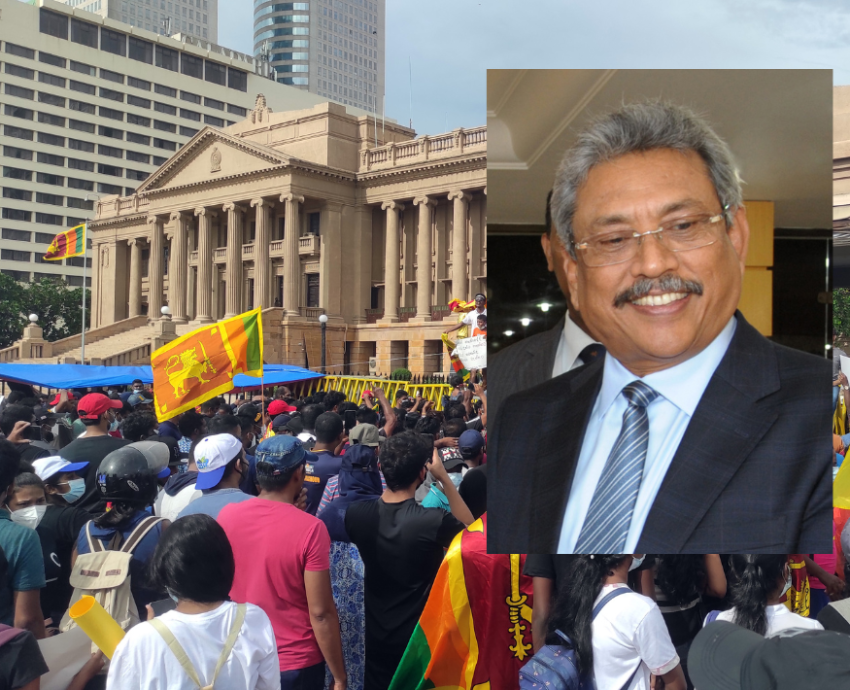
After nearly two months in exile, former President Gotabaya Rajapaksa returned to Sri Lanka on September 3 and was welcomed by an entourage of supporters. Gotabaya and his wife returned on a night flight amid a large military presence at the airport. They were swiftly taken to an official residence in a heavily guarded motorcade.
This was coordinated by Ranil Wickremasinghe, whom Gotabaya appointed president before he fled the country amid mass protests.
Gotabaya left the country unceremoniously on July 13 on an air force plane to the Maldives, from where he sent in his resignation a day later. Then he proceeded to Singapore, followed by Thailand, where he was confined to a hotel surrounded by security personnel.
When Gotabaya was elected in November 2019, the price of bread was around Rs60 a loaf. By the time he fled in July 2022, it had risen to Rs160, and today it is Rs300.
Gotabaya was the defence secretary under Mahinda Rajapaksa’s regime, (2005‒15) and is implicated in allegations of war crimes. After his election as president, he appointed military officers to head important public bureaucracies and concentrated more power in the presidency by passing new amendments to the constitution.
Gotabaya was elected on a “national security” campaign following the Easter Sunday bombings in April 2019 that year, which killed nearly 270 people, including 45 foreign nationals from 14 countries. But he failed to allow a proper investigation into the incident, which revealed possible links between so-called “Muslim extremists” and state intelligence services. The Catholic community and other victims continue to demand justice.
Shameful record
Under Gotabaya, the state response to the COVID-19 pandemic was a mess, with military officers appointed to head a presidential task force. Government messages were inconsistent and interventions were delayed. In the early months of 2020, the government — keen to avoid pressure on the economy — promoted local remedies with “mystical powers”, such as throwing holy water into rivers. Meanwhile, anti-Muslim sentiments were reinforced by the introduction of a mandatory cremation policy discriminating against Muslim communities.
Government-enforced quarantine laws and essential services regulations were used to suppress freedom of speech and assembly. These particularly targeted Tamil and Muslim communities in the North and East, as well as the trade union movement. For example, when a broad alliance of students and unions protested against the privatisation of a public university, the head of the teachers union, Joseph Stalin, was arrested (see Green Left Issue 1349) despite following public health orders. This militarised response undermined community engagement, which could have saved more lives and better protected communities.
While the COVID-19 pandemic was significant in worsening the economic crisis, it had more to do with state patronage systems involving clientelist networks. These networks undermined the state bureaucracy by appointing allies into key positions and syphoning public money through tax exemptions, commissions and public-private partnerships. Meanwhile, the Central Bank engaged in speculation as a stock market player, depleting foreign exchange reserves. By early last year, the economy was on a path to debt default, the cost of living was sky rocketing and there were shortages of essential items due to the lack of foreign currency reserves.
IMF bailout
Just a few days before Gotabaya returned, the Sri Lankan government was finally bailed out by the International Monetary Fund (IMF), with the extension of a US$2.9 billion loan over four years. Most of this money will return to financial institutions that invested in Sri Lankan sovereign bonds.
In June, the government was sued in a New York federal court by a group of bond holders seeking full payment of principal and interest. Along with Hamilton Reserve Bank Ltd, based in St Kitts & Nevis, creditors included Fidelity Investments, BlackRock, T Rowe Price, Lord Abbett, JPMorgan, PIMCO and Neuberger Berman.
The largest creditors were engaged in restructuring negotiations with the government, which have not been transparent to the public. IMF loan conditions generally involve privatisation of state enterprises, commercialisation of public services and reductions in social protection measures. In effect, the Gotabaya regime was central to expropriating the public wealth of this tiny island by financial actors in the Global North.
The Rajapaksa regime’s party still retains the majority in parliament, and efforts to create a “coalition of all parties” to govern was blocked by it. Nevertheless, splits within the ruling party have led to new political configurations, with two new parties formed in the first week of September. These new formations, along with the dominant political parties, are entrenched in Sinhala-Buddhist nationalism, meaning continued military colonisation of the North and East. Moreover, they are proponents of neoliberal capitalism — central to the suffering of the masses.
Repression
Meanwhile, the repression of activists from the people’s movement is continuing in full force, with activists arrested. Three student activists were arrested under the draconian Prevention of Terrorism Act (PTA), which allows up to a year’s detention without trial. This same law enables disappearances, torture and impunity for perpetrators.
Police raided a media conference called by the student movement to oppose the use of the PTA on August 23. Police almost outnumbered the 50 media, trade union and civil society activists gathered at the conference, and boldly arrived in a white van — a reminder of the disappearances under the Mahinda Rajapaksa regime.
For the financial actors in the Global North, this state repression is a necessary condition for recovering their profits from financial speculation.